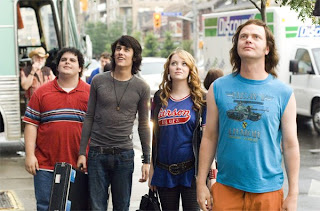Reading Aloud versus Acting It Out
I've just discovered that my library offers downloadable audiobooks for checkout, and in the interests of multitasking I've been giving the service a whirl.
I'm a tough customer. I read pretty fast when I'm reading silently. Reading aloud is much slower, and I realize I give a book the same amount of time—so not as many pages—grace period. The audio version has to hook me early to keep me with it. It's not just the content that might catch me or chase me away, though. My mother was a musician who went into radio, and my father was in linguistics. Hearing the parental job chatter has left me sensitive to sound quality, vocal effects, and dialects. Readers who deploy breathy women, gruff men, and cartoonish Southerners make me want to pass out throat lozenges and anthropologist surveys and move on to the next book.
This month is Script Frenzy, a challenge to write a screenplay in 30 days, so I've been thinking about more of the technical aspects of writing style. For my project, I'm adapting a novel into a film script. As I decide what to cut, what to translate to fit into the new format, it reminds me of the audiobooks. Many audiobook readers are actors; to what degree is a novel a script?
Novels may leave more to the imagination, but they spell out more than most screenplays, too. A movie can show in a glance what a book might take pages to describe; a novel can reveal depths of interior life that movies have trouble showing in much detail. Dialogue in movies and books have tactics that aren't available to audio versions: actual different actors in the movie, separate lines for each speaker in books.
Writers don't just rely on the visual to distinguish between speakers, of course, which brings me back to my whine about some audiobooks and their affected voices. The words themselves offer clues about the speaker. Maybe the words are enough, or maybe it's like advice about writing in dialect: a little goes a long way.
I get great pleasure out of listening to a good audiobook, though. My multitasking premise is thwarted; I can't listen closely and pay attention to a task of any complexity at the same time. I'm reminded why my kids like to be read to, even though they can now read to themselves. Hearing a voice, letting the words roll over you, adds another layer of absorption in the story and at least the illusion of community—someone else is reading this book!
You can hear some great original audio shorts at the Third Coast Audio Festival. You can read screenplays online (scroll down the #scriptchat page for a list of links). See Hamlet instead of reading it, David Tennant as Hamlet (virtue is its own reward). Are there any voices that make you melt? (I won't laugh if you won't bring up my thing with the Geico guy.)

You make an interesting point when you say that novels leave more to the imagination. They leave the visual to the imagination, however they definitely shape it by describing images or how people look.
ReplyDeleteYou also get an added layer of intimacy with books. For example, Revolutionary Road the film is based on the book. When he comes to see his wife in her dressing room all you see is there interaction which can be very telling, but the book goes further and shows his psychological process of how he wants to be a good husband but he just doesn't make the effort.
I always wanted to try to write an adapted screenplay from a book. I think the Cohen brothers did a great job with True Grit! What book are you thinking of working with?
I have to say I am not a fan of audiobooks or the kindle, electronic books. I much prefer to read how the author plays on the page and hold the pages in my hand and smell that old fashioned book smell. However, if the local chapters does not have the book you are looking for then iTunes audiobooks is a good second choice.
Really interesting and challenging post!
Murissa
canadianculinarytravel.blogspot.com
Murissa, I edit books for my job, which happens on a computer screen most of the time. I suspect this has a lot to do with why I hate (recreational) reading e-books: pulling up another file doesn't quite shift me into another zone.
ReplyDeleteI'm adapting Sense and Sensibility into modern times as well as into film. I thought adapting would be a good exercise for my first effort: since the characters are already developed, I can spent my time figuring out the format and the medium.
Oh I love Sense and Sensibility. I really loved the first Bridget Jones as she this was Pride and Prejudice in modern film too.
ReplyDeleteI have to read so many articles and I write a lot on my computer as well for school and poetry/short stories etc. So reading on an electronic (like you said) is so tedious.
Good luck with your adapted screenplay!!!
Interesting post. I've never listened to an audio book. But I've been curious about them. True what you said about a movie versus a book.
ReplyDeleteA woman I once knew told me a story of how she was listening to a romance novel while driving to work. The novel got to a very steamy part, and this woman was so involved in the story that she missed her exit off the interchange. She got to work late and sweating a little from the steamy scene. She couldn't tell anyone the truth of why she was late. I'd say whoever did that audio book did a great job.